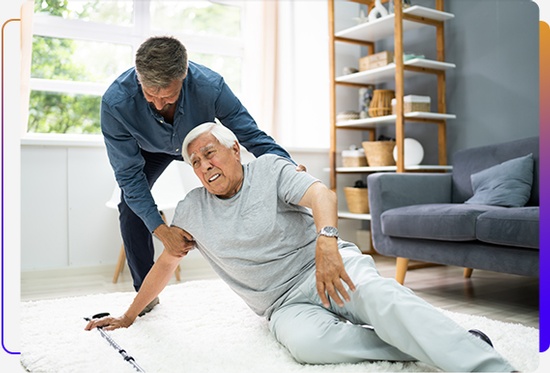
Many Possible Causes
Falls don't "just happen," and people don't fall because they get older. Often, more than one underlying cause or risk factor is involved in a fall. A risk factor is something that increases a person's risk or susceptibility to a medical problem or disease.
As the number of risk factors rises, so does the risk of falling. Many falls are linked to a person's physical condition or a medical problem, such as a chronic disease. Other causes could be safety hazards in the person's home or community environment.
Risk Factors
Scientists have linked a number of personal risk factors to falling:
Muscle weakness, especially in the legs, is one of the most important risk factors. Older people with weak muscles are more likely to fall than are those who maintain their muscle strength, as well as their flexibility and endurance.
Your balance and your gait -- how you walk -- are other key factors. Older adults who have poor balance or difficulty walking are more likely than others to fall. These problems may be linked to a lack of exercise or to a neurological cause, arthritis, or other medical conditions and their treatments.
Blood pressure that drops too much when you get up from lying down or sitting can increase your chance of falling. This condition -- called postural hypotension -- might result from dehydration, or certain medications. It might also be linked to diabetes, neurological conditions such as Parkinson's disease, or an infection.
Some people with postural hypotension feel dizzy when their blood pressure drops. Other people don't feel dizzy, even if their blood pressure drops a lot when they get up.
Your reflexes may also be slower than when you were younger. The increased amount of time it takes you to react may make it harder to catch your balance if you start to fall.
Foot problems that cause painful feet, and wearing unsafe footwear can increase your chance of falling. Backless shoes and slippers, high-heeled shoes, and shoes with smooth leather soles are examples of unsafe footwear that could cause a fall.
Sensory problems can cause falls, too. If your senses don't work well, you might be less aware of your environment. For instance, having numbness in your feet may mean you don't sense where you are stepping.
Not seeing well can also result in falls. One reason is that it may take a while for your eyes to adjust to see clearly when you move between darkness and light.
Other vision problems contributing to falls include poor depth perception, cataracts, and glaucoma. Wearing multi-focal glasses while walking or having poor lighting around your home can also lead to falls.
Confusion, even for a short while, can sometimes lead to falls. For example, if you wake up in an unfamiliar environment, you might feel unsure of where you are. If you feel confused, wait for your mind to clear or until someone comes to help you before trying to get up and walk around.
Some medications can increase a person's risk of falling because they cause side effects like dizziness or confusion. The health problems for which the person takes the medications may also contribute to the risk of falls.
The more medications you take the more likely you are to fall. People who take four or more prescription drugs have a greater risk of falling than do people who take fewer drugs. You should check with your doctor if you think your medications are causing dizziness or unsteadiness. Your doctor can tell you which drugs, including over-the-counter medicines, might cause problems. Do not change your medications on your own.
What a Fall Might Mean
Be sure to talk with your doctor if you fall, as well. A fall could be a sign of a new medical problem that needs attention, such as an infection or a cardiovascular disorder. It could also suggest that a treatment for a chronic ailment, such as Parkinson's disease or dementia, needs to be changed.
Most Falls Happen at Home
Although falls can happen anywhere, well over half of all falls happen at home. Falls at home often happen while a person is doing normal daily activities. Some of these falls are caused by factors in the person's living environment. For instance, a slick floor or a poorly lit stairway may lead to a fall.
Other factors that can lead to falls at home include:
- Loose rugs
- Clutter on the floor or stairs
- Carrying heavy or bulky things up or down stairs
- Not having stair railings
- Not having grab bars in the bathroom
Simple changes can help make your home safer.
*Content credited to National Library of Medicine (NLM)
We offer a variety of services including Alzheimer's Care, Home Care for Disabled, Around the clock In-Home Care when necessary, Positioning, Medication Reminder, Meal Preparation, Light Housekeeping, Doctors Visit, Respite Care, Family Care-Giving, Shopping, Errands, etc.
Our Certified Nurse Assistants / Caregivers serve clients across Round Rock , Georgetown , Pflugerville , Austin , and the surrounding areas.
Contact Guiding Angels about helping you make your home safer and to get some tips to prevent falls at home.